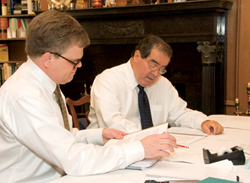A Quote by I. A. Richards
In the simplest formulation, when we use a metaphor we have two thoughts of different things active together and supported by a single word, or phrase, whose meaning is a resultant of their interaction.
Related Quotes
Never use a metaphor, simile, or other figure of speech which you are used to seeing in print. Never use a long word where a short one will do. If it is possible to cut a word out always cut it out. Never use the passive voice where you can use the active. Never use a foreign phrase a scientific word or a jargon word if you can think of an everyday English equivalent. Break any of these rules sooner than say anything outright barbarous.
The word "metaphor" means carrying something from one place to another . . . and it is when you describe something by using a word for something that it isn't. This means that the word "metaphor" is a metaphor. I think it should be called a lie because a pig is not like a day and people people do not have skeletons in their cupboards. And when I try and make a picture of the phrase in my head it just confuses me because imagining and apple in someone's eye doesn't have anything to do with liking someone a lot and it makes you forget what the person was talking about.
Words can mean different things to different people. It is important to understand what people mean when they use a certain word. Let's make an example. Take the word gay. Fifty years ago, gay meant exclusively cheerfulness, lighthearted excitement, merry or bright colors. Today this word has a different meaning. You won't call a cheerful person gay because it could be understood as something else.
A word about 'plain English.' The phrase certainly shouldn't connote drab and dreary language. Actually, plain English is typically quite interesting to read. It's robust and direct-the opposite of gaudy, pretentious language. You achieve plain English when you use the simplest, most straightforward way of expressing an idea. You can still choose interesting words. But you'll avoid fancy ones that have everyday replacements meaning precisely the same thing.
In case any are puzzled by the different translations from which I draw strength and help and delight, it is like this: In studying any object with the microscope we use different lenses and turn the mirror in various ways; each change brings out some new wonder and beauty. So it is for those who are not Greek or Hebrew scholars, and who use the work of scholars to open the meaning of the exhaustible Word-the Bible is richer than any single version can fully show.
Whenever we remember a series of events, we remember them different. We are constantly changing. It's a flaw, but on the other hand, when we say a word, the meaning is not what you put into it. Rather, the meaning of the word is all of the past usages of that word. Like this cloud that makes up the meaning of the word. It's your subject if you write. For instance what you put in that word and what you assume it means, even its flaw. It has a general agreement.
We cannot control the way people interpret our ideas or thoughts, but we can control the words and tones we choose to convey them. Peace is built on understanding, and wars are built on misunderstandings. Never underestimate the power of a single word, and never recklessly throw around words. One wrong word, or misinterpreted word, can change the meaning of an entire sentence - and even start a war. And one right word, or one kind word, can grant you the heavens and open doors.
I suppose there is something appealing about a word that everyone uses with absolute confidence but on whose exact meaning no two people can agree. The word that I'm thinking of right now is genre, one of those French words, like crêpe, that no one can pronounce both correctly and without sounding pretentious.
































